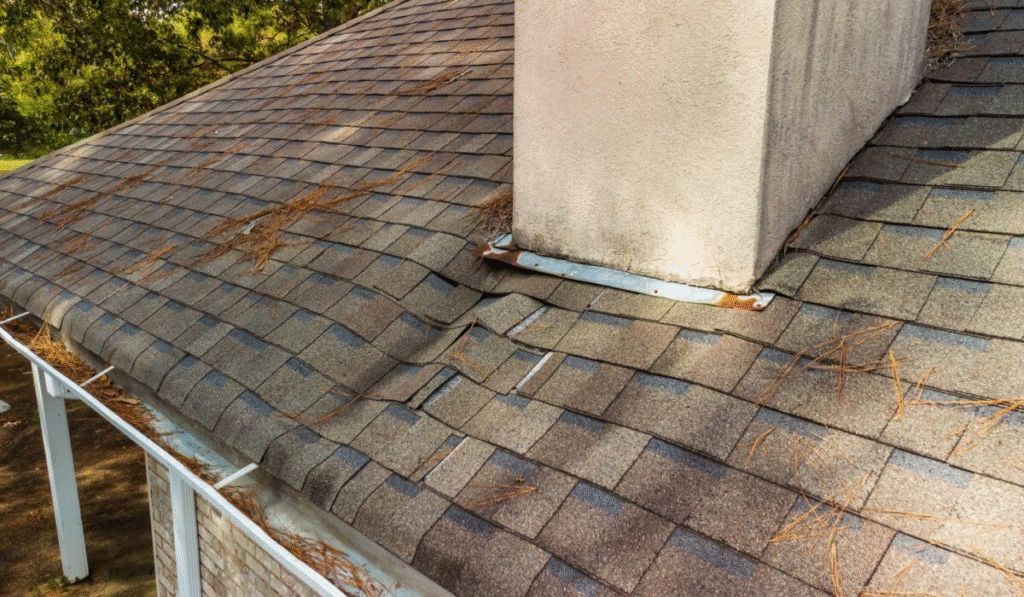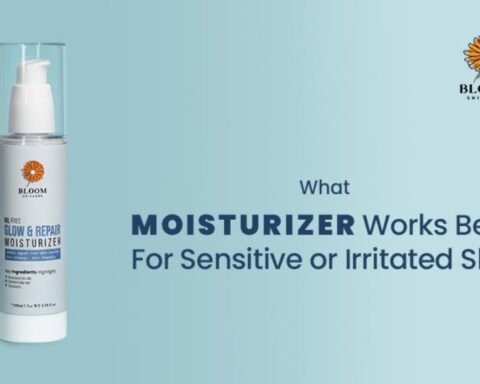Last year, a property owner in Business Bay watched 38,000 AED vanish over six months. Not from a bad investment or market crash. From choosing the wrong management company. They promised “full service” but delivered spotty cleaning, slow maintenance response, and occupancy rates that barely hit 60%. By the time he switched providers, his property’s Airbnb rating had dropped to 4.1 stars, and climbing back took another four months of perfect guest experiences.
The financial hit wasn’t just lost revenue. It was DTCM fines for compliance issues his management company ignored. Emergency AC repairs during August because preventative maintenance never happened. Guest damage claims that went nowhere because nobody properly documented property condition. When you add it all up, choosing poorly costs more than most owners realize.
Dubai’s short-term rental market is printing money right now for property owners who get the management piece right. Properties in prime locations routinely outperform long-term leases by 15-25%. But that gap only exists when you’ve got professional operators handling the details that separate high performers from properties that just sit there collecting dust and occasionally getting booked.
The difference between a property earning 150,000 AED annually versus 95,000 AED often comes down to management quality, not the property itself. Same building, similar units, completely different results. One owner has dynamic pricing, professional photography, quick maintenance response, and strict guest screening. The other has… well, whoever answers the phone sometimes and a cleaning crew that shows up when they remember.
We spent eight weeks researching Dubai’s Airbnb management companies. We’re talking website analysis, pricing verification as of October 2025, reviews from the past year on Google and Clutch, conversations with actual property owners, and digging into what these companies actually deliver versus what they promise in sales meetings. We wanted to know what happens when the AC breaks at midnight, how quickly maintenance actually responds, and whether those occupancy rate projections hold up in reality.
This isn’t a list of every company operating in Dubai. It’s an analysis of firms with track records we could verify, pricing we could document, and performance we could assess through actual client experiences. Whether you own a luxury apartment in Downtown Dubai or a studio in an emerging neighborhood, you’ll find specific intel here about who handles what well and where each company’s strengths actually lie.
The Dubai Short-Term Rental Reality Check
Dubai’s short-term rental market isn’t what it was three years ago. Competition has intensified. DTCM regulations have tightened. Guest expectations have risen. Properties that could coast on location alone in 2022 now need professional management to maintain competitive occupancy rates.
Current market realities: Downtown Dubai and Dubai Marina properties are seeing average occupancy rates around 75-85% when properly managed. JVC and JVT properties typically hit 70-80%. These numbers assume professional photography, dynamic pricing, multi-platform listing, and responsive guest communication. Self-managed properties or those with budget operators often run 15-20 percentage points lower.
DTCM compliance isn’t negotiable anymore. Every short-term rental needs proper registration, appropriate insurance, safety standards, and regular renewals. Fines for non-compliance start at 10,000 AED and can reach 50,000+ AED for repeat violations. Management companies should handle this entirely, but some don’t. Ask directly about DTCM licensing status and what happens when regulations change.
Pricing dynamics have gotten more sophisticated. Static rates don’t cut it anymore. Properties need daily rate adjustments based on competitor pricing, local events, booking velocity, and seasonal patterns. A property charging 600 AED per night during Arab Health week is leaving money on the table. One charging 600 AED during slow August weeks sits empty. The difference between smart pricing and static rates can be 20-30% in annual revenue.
Property maintenance affects long-term value. Short-term rentals experience more wear than long-term leases. Frequent guest turnover means more stress on appliances, furniture, and finishes. Management companies should run regular inspections and preventative maintenance programs. Reactive-only maintenance (fixing things after they break) costs more and creates guest experience problems.
How We Evaluated These Companies
Our research ran from August through October 2025. We verified pricing and service information directly from company websites, noting verification dates. For companies without transparent pricing, we requested quotes for hypothetical properties in different locations.
We prioritized track record over marketing promises. Years in business matters. Portfolio size provides context. Award recognition indicates industry standing. Client retention rates reveal whether owners stick around or leave after experiencing actual service quality.
We analyzed recent reviews from the past 12 months on Google, Clutch, and industry-specific platforms. We looked for patterns—what do satisfied clients mention repeatedly? What complaints show up across multiple reviews? One negative review happens to everyone. Five reviews mentioning slow maintenance response indicates a systemic problem.
We contacted property owners currently using these services. Not testimonials on websites, but actual conversations about what works, what doesn’t, and what surprised them (good or bad) after signing up. These discussions revealed details no sales pitch covers.
We assessed transparency. Companies that clearly state their fees, explain their processes, and provide sample reports scored higher than those requiring consultations before sharing basic information. If a company won’t tell you their commission percentage until you’re sitting in their office, that’s a red flag.
We didn’t consider company size alone, lowest fees, or flashiest websites. Large doesn’t always mean better. Cheap often means corners cut somewhere. Pretty marketing doesn’t equal actual performance. We focused on verified results, transparent operations, and demonstrated competence.
The Companies
1. Deluxe Holiday Homes
At a Glance: Founded 2015 | 700+ Properties | Award-Winning Service | Full DTCM Licensed
At a Glance: Founded 2015 | 700+ Properties | Award-Winning Service | Full DTCM Licensed
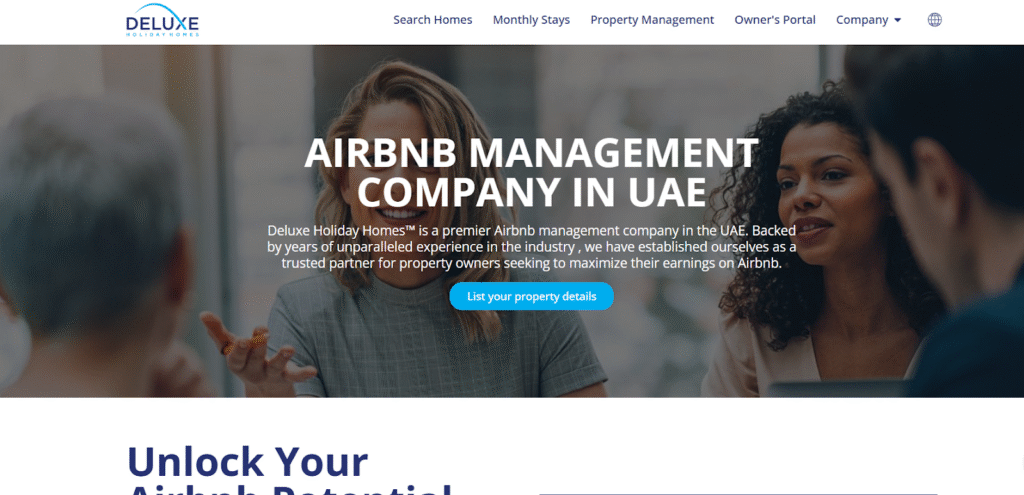
Deluxe Holiday Homes operates with the kind of systems you’d expect from a company that’s managed hundreds of properties through multiple market cycles. They’ve been doing this since 2015, which means they’ve seen Dubai’s short-term rental market through its growth phases, regulatory changes, and seasonal patterns that newer operators haven’t experienced yet.
What They Do Differently
They run full-spectrum operations that cover everything from initial listing creation through guest checkout and post-stay follow-up. Their owner portal provides real-time visibility into bookings, financial performance, and property status. You’re not waiting for monthly reports or emailing someone for updates—the information is there when you want it.
Their dynamic pricing system adjusts rates daily based on dozens of market signals. During major events like Arab Health, GITEX, or Dubai Shopping Festival, rates automatically increase to capture peak demand. During slower periods, strategic pricing maintains occupancy instead of leaving properties empty. This active management approach typically generates better annual returns than static pricing strategies.
The company handles professional photography as part of their service. Not iPhone snapshots, but proper shoots that showcase your property’s strengths. They understand platform algorithms and what makes listings click-worthy. Properties need to look good in thumbnail view and detailed gallery view. Their photography team knows how to achieve both.
Guest screening runs through multiple verification steps before bookings get confirmed. They’re checking IDs, reviewing guest history on booking platforms, and setting clear expectations about house rules and property standards. This filtering reduces damage incidents and neighbor complaints significantly.
Property maintenance operates on preventative schedules, not just reactive responses. Regular inspections catch small issues before they become expensive problems. When urgent repairs are needed, they have established contractor relationships that get things done quickly. Response times for emergency issues run in hours, not days.
Their 24/7 support handles guest communication around the clock. When someone messages at 2 AM about check-in logistics or a maintenance issue, they get actual responses, not automated replies. This responsiveness shows up in guest reviews and directly impacts property ratings.
Where They Shine
Deluxe Holiday Homes works particularly well for luxury and mid-to-high-end properties in prime Dubai locations. Their systems and pricing strategies are built around properties in Downtown Dubai, Dubai Marina, Business Bay, and Palm Jumeirah. If your property can command premium rates, they know how to position and price it effectively.
They’re strong for absentee owners who live abroad or have multiple properties. Their owner portal and automated reporting mean you don’t need to be actively involved in daily operations. You get transparency and control without needing to micromanage details.
Properties that benefit from professional presentation—those competing against dozens of similar units in the same area—see significant advantages from their photography and listing optimization. Making your apartment stand out when 40 other two-bedrooms in the same building are also listed requires expertise in visual presentation and copy writing.
Real Performance Example
A property owner with a two-bedroom in Downtown Dubai switched from self-management to Deluxe Holiday Homes after struggling with inconsistent bookings and below-market rates. After the switch, occupancy increased from 62% to 84% over three months. Average nightly rate improved by 30% through better pricing strategy aligned with local events and seasonal demand. Annual revenue increased by 45% while maintenance costs decreased due to preventative care programs. The owner reported saving approximately 15 hours weekly previously spent on guest communication and booking management.
Pricing Transparency
Management fees typically range from 20-25% of rental revenue depending on property type and service level. This includes professional photography, listing management across multiple platforms, dynamic pricing, guest screening and communication, cleaning coordination, maintenance management, and 24/7 support. Setup fees for new properties run 2,000-3,500 AED covering initial photography, listing creation, and property onboarding.
2. Island Falcon Property Management (IFPM)
At a Glance: Founded 2010+ | 10+ Years Experience | Claims Up to 60% Income Boost | Full Service
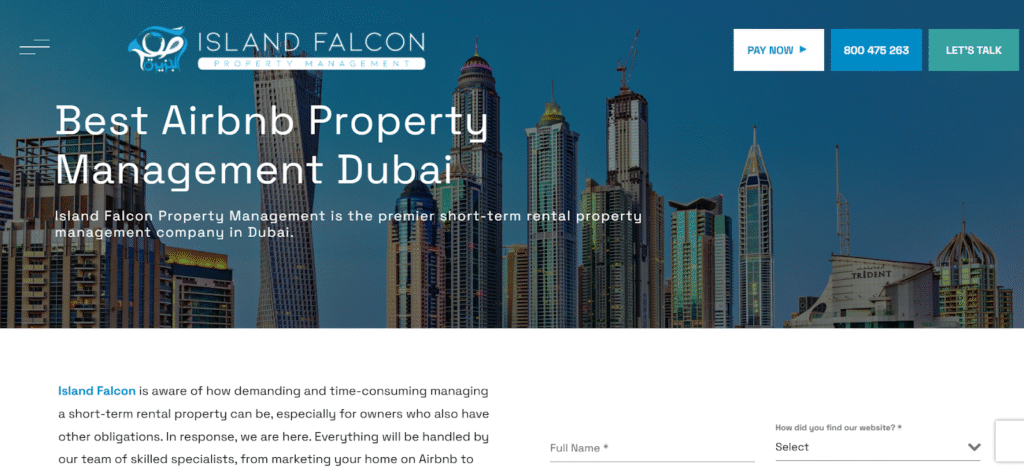
Island Falcon has been operating in Dubai’s property management space for over a decade, giving them deep local market knowledge and established systems. They position themselves as a comprehensive solution handling everything from listing optimization through guest management and property maintenance.
What They Do Differently
IFPM emphasizes their “one-family company culture” and customer-centric approach. They’ve built their operation around personalized service rather than pure volume scaling. Their team includes dedicated housekeepers with hospitality backgrounds and maintenance staff who handle everything from minor repairs to emergency issues.
They offer insurance coverage specifically for short-term rentals and holiday homes, which protects property owners from risks that standard property insurance doesn’t always cover. This added protection layer matters when you’re having different guests every few days versus one long-term tenant.
Their guest vetting process includes thorough screening before confirming bookings. They’re checking guest backgrounds and previous reviews to ensure your property goes to responsible renters. They also handle all guest communication from initial inquiry through checkout, including organizing seamless check-ins and providing on-site support throughout stays.
The company provides detailed performance reports to owners. You’re not guessing how your property is doing—they document everything and make reports available upon request. This transparency helps owners understand exactly what’s generating returns and what’s costing money.
Where They Shine
IFPM works well for owners who want established, experienced operators with long Dubai market presence. If you’re risk-averse and prefer working with companies that have survived multiple market cycles, their 10+ year track record provides that stability.
They’re suitable for properties across different price points, not just luxury units. Their service structure accommodates mid-range properties where boutique luxury operators might not be economically viable.
Properties where insurance coverage matters particularly—perhaps in buildings with strict regulations or owners concerned about liability—benefit from their included short-term rental insurance.
Real Performance Example
IFPM claims clients can see rental income increases up to 60% through their management and marketing services. They market properties across multiple booking platforms to maximize visibility and bookings. Their professional photography services and detailed listing descriptions aim to make properties stand out in search results.
Pricing Transparency
Management fees range from 10-30% of rental revenue depending on service level and property type. Additional services like cleaning, maintenance, and guest relations may incur separate charges. The wide fee range reflects different service packages—basic listing management costs less than full-service operations including concierge services.
3. Royale Stays
At a Glance: Luxury Focus | Boutique Operation | Transparency-Driven | Guest Experience Specialists
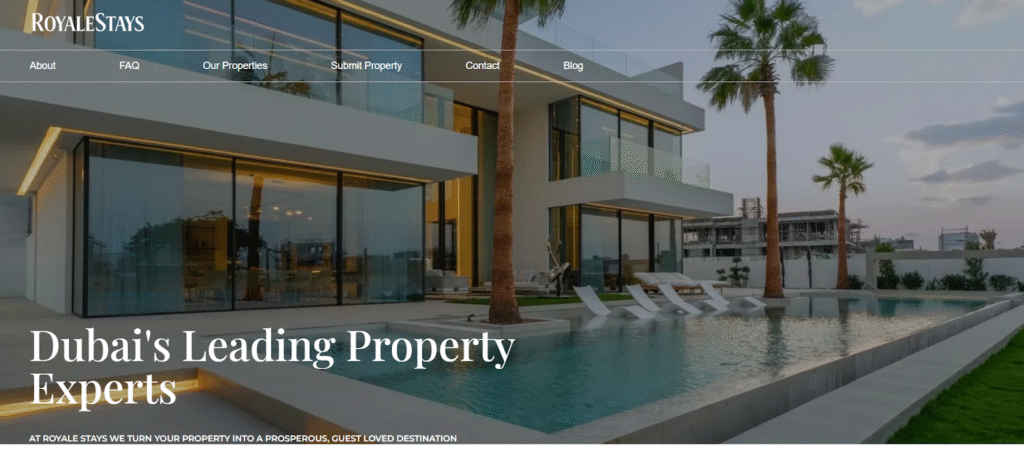
Royale Stays positions itself as a premium boutique operator focused on creating “royalty-level” property experiences. They emphasize transparency, consistency, and performance across their managed portfolio.
What They Do Differently
Royale Stays built their model around four core principles: transparency (clear reporting, no hidden fees), consistency (reliable service and guest-ready standards), performance (optimized pricing and high occupancy), and care (managing properties with integrity and attention). These aren’t just marketing terms—they structure their operations around these commitments.
They focus on creating “curated stays” rather than just managing rental properties. Each listing reflects their design standards and guest experience approach. They’re targeting properties that can deliver premium experiences and command accordingly premium rates.
Their communication approach emphasizes clear, honest updates to property owners. You’re not getting vague “everything’s fine” messages—they provide specific performance data and transparent financial reporting without hidden deductions or surprise fees.
Guest reviews for Royale Stays-managed properties consistently mention cleanliness, communication quality, and location convenience. Recent reviews from July 2025 highlight responsive hosts, well-maintained properties, and excellent locations—the factors that drive repeat bookings and high ratings.
Where They Shine
Royale Stays works best for owners of upscale properties who want boutique-level attention. If you own a well-appointed apartment or villa that deserves premium positioning, their focus on curated experiences matches that market segment.
They’re strong for owners who prioritize transparency and clear communication over pure volume. Their boutique size means more direct relationship with your property manager rather than being account number 437 in someone’s database.
Properties where guest experience really drives value—places where little touches and personalized service justify higher nightly rates—align well with their approach. They’re creating stays people remember and review positively, not just providing somewhere to sleep.
Real Performance Example
Based on their marketing materials, short-term rental owners earn on average 10-15% more revenue compared to traditional long-term leasing, even after management costs. Their fully-managed service handles guest communication, cleaning, and all operational details so owners can focus on returns rather than tasks.
Pricing Transparency
Specific fee structures aren’t publicly listed on their website. Based on their premium positioning and full-service approach, expect fees toward the upper range of the market (20-30% of rental revenue). Their “no hidden fees” commitment suggests transparent pricing once you’re in discussions with them, but upfront public pricing would be more helpful.
4. HiGuests
At a Glance: International Operator | 20+ Booking Platforms | Tech-Driven | 18% Management Fee
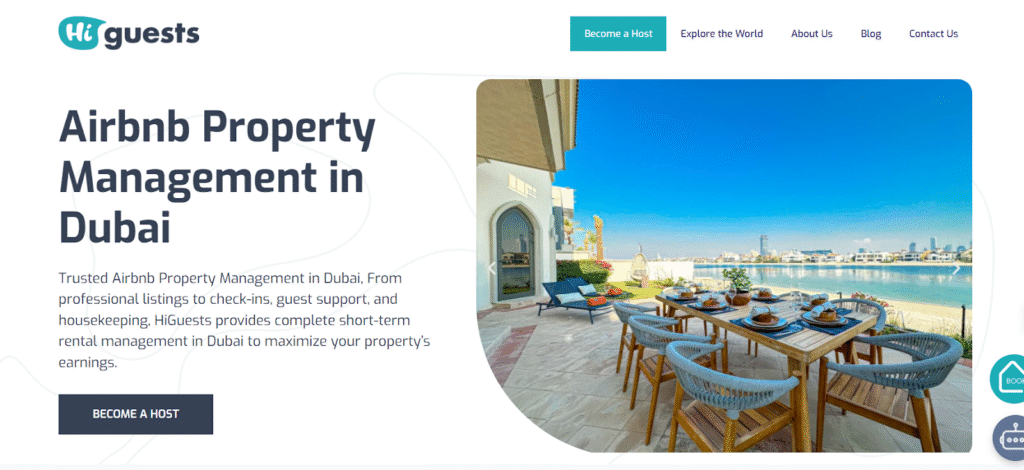
HiGuests operates as an international short-term rental management company with presence in multiple cities including Dubai. Founded in Barcelona, they bring global operations experience to the Dubai market with a technology-focused approach.
What They Do Differently
HiGuests lists properties across 20+ booking platforms simultaneously, maximizing visibility beyond just Airbnb and Booking.com. More platforms mean more potential guests seeing your property, which can increase booking opportunities especially during slower periods.
They offer 24/7 guest support with dedicated teams handling inquiries, check-ins, check-outs, and any issues during stays. Their international operation means support infrastructure that runs around the clock across time zones.
Their service includes tailored guest experiences—local tour recommendations, personalized welcome touches, and curated additions that elevate stays beyond basic accommodation. They’re positioning properties as memorable experiences rather than just places to stay.
The company emphasizes smooth logistics handling including key management, property walkthroughs, and transition coordination. When guests arrive and depart, HiGuests manages all the details that can make or break first and last impressions.
Where They Shine
HiGuests works well for owners who want broad platform exposure. If you’re concerned about over-reliance on Airbnb or want to capture guests browsing niche booking sites, their 20+ platform approach provides that diversification.
Their international presence suits owners with properties in multiple cities or those who appreciate working with operators experienced in various markets. Lessons learned managing properties in Barcelona or other cities get applied to Dubai operations.
Properties targeting international travelers benefit from their guest experience focus and multilingual support capabilities. When you’re hosting guests from dozens of different countries, having management that understands various cultural expectations helps.
Real Performance Example
Their Dubai operations emphasize maximizing rental income through multi-platform listing and professional management. Specific performance metrics for Dubai properties aren’t detailed on their site, but their international track record shows experience managing properties across different markets.
Pricing Transparency
Management fees start at 18% of rental revenue according to their general pricing structure. This sits at the lower-to-middle range of the market. What’s included at that base rate versus what incurs additional charges requires clarification—cleaning, maintenance, and setup fees may be separate.
5. Relaxy Stay
At a Glance: Dubai-Based | Ras Al Khor Location | Local Operator
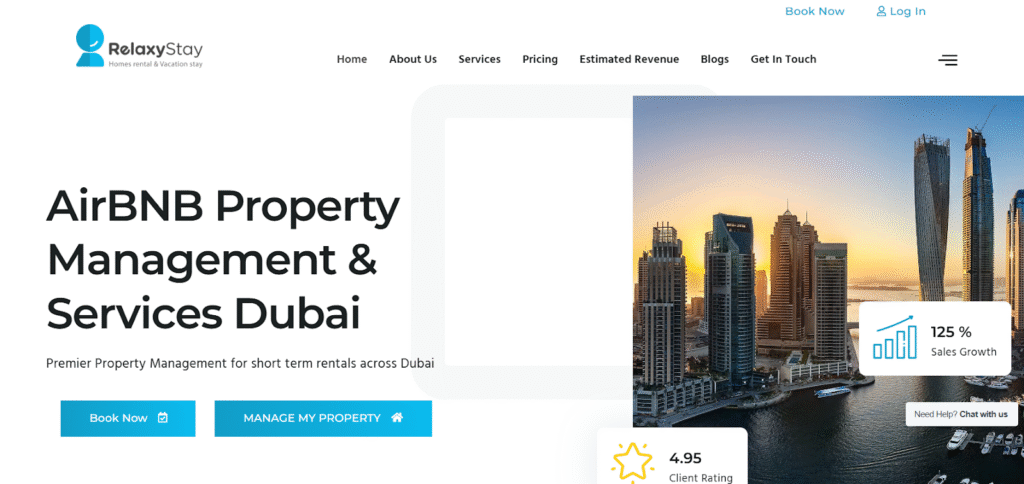
Relaxy Stay operates as a Dubai-based property rental management company, positioning themselves among the city’s leading operators in the space.
What They Do Differently
As a locally-focused operator based in Ras Al Khor, Relaxy Stay brings Dubai-specific market knowledge. They’re not running international operations—their focus stays on understanding and serving the Dubai rental market specifically.
Their location in Dubai’s industrial area suggests operational efficiency and cost structure that might translate to competitive pricing. Companies with lower overhead in prime commercial areas sometimes pass those savings through to clients.
Where They Shine
Local operators like Relaxy Stay work well for owners who prefer working with Dubai-focused companies rather than international chains. If you value local connections, market-specific knowledge, and relationship-driven service, locally-based operators deliver that approach.
Real Performance Example
Limited public information about specific performance metrics or case studies makes it difficult to assess their track record compared to other operators. Their positioning as “one of the leading property rental management companies in Dubai” suggests established presence, but verification of this claim requires more research.
Pricing Transparency
Pricing information isn’t publicly available on their website. Owners need to contact them directly for fee structure details. This lack of upfront pricing transparency makes initial comparison difficult.
Beyond the Marketing: What Actually Drives Results
Management companies love talking about “maximizing revenue” and “optimizing occupancy.” But what actually makes the difference between properties that consistently perform and those that underdeliver?
Dynamic Pricing That Actually Works
Real dynamic pricing adjusts rates multiple times daily based on:
- Competitor pricing in your building and neighborhood
- Booking velocity (how quickly dates are filling)
- Local events and conferences
- Seasonal demand patterns
- Day of week (weekends vs. weekdays command different rates in Dubai)
- Length of stay (weekly discounts vs. nightly premiums)
Properties using sophisticated pricing algorithms earn 20-30% more annually than those with static rates. The difference shows up most dramatically during shoulder seasons when demand fluctuates weekly. A property charging 450 AED every night in November leaves money on the table during strong weeks and sits empty during weak ones. Smart pricing captures 650 AED during high-demand periods and adjusts to 380 AED when needed to maintain occupancy.
Guest Experience Factors That Impact Your Bottom Line
Guest ratings directly affect booking volume. Properties rated 4.8+ stars get significantly more visibility in platform algorithms and bookings than those rated 4.5 or below. A 0.3 star difference can mean 15-20% fewer bookings.
What drives ratings? Cleanliness (mentioned in 80%+ of reviews), communication responsiveness (guests notice when messages go unanswered for hours), check-in smoothness (complicated entry procedures frustrate travelers), and property accuracy (photos and descriptions matching reality).
Management companies that maintain consistent 4.9+ star ratings across their portfolio do so through systematic approaches—detailed cleaning checklists, rapid message response protocols, clear check-in instructions, and honest property representation in listings.
Maintenance Approaches That Save vs. Cost Money
Reactive maintenance (fixing things after they break) costs more and creates guest experience problems. When the AC fails during a guest’s stay, you’re paying for emergency service rates plus potentially refunding the guest or dealing with negative reviews.
Preventative maintenance (regular inspections and proactive repairs) costs less and prevents problems before guests experience them. Monthly or quarterly inspections catch issues like slow-draining sinks, AC filters needing replacement, or appliances showing early failure signs. Addressing these proactively costs 30-40% less than emergency repairs and avoids guest impact.
Better management companies build preventative schedules into their operations. They’re not waiting for guests to report problems—they’re checking systems regularly and maintaining equipment before failures occur.
The Real Comparison: What to Weigh
Comparing management companies requires looking beyond commission percentages. Here’s what actually matters:
Performance Indicators That Matter
Occupancy rate × average daily rate = your actual revenue reality. A company promising 95% occupancy at low rates might generate less revenue than one achieving 75% occupancy at premium rates. Ask for projected gross revenue, not just occupancy percentages.
Guest ratings across their portfolio indicate service consistency. One property rated 5.0 stars might be an outlier. Twenty properties all rated 4.8+ stars indicates systematic quality.
Owner retention rates reveal whether clients stick around or leave after experiencing actual service. Companies with 70%+ retention rates over multiple years are doing something right. High owner churn suggests problems that don’t show up in sales presentations.
Service Quality Markers You Can Verify
Response time commitments for emergencies. “24/7 support” means nothing without specific guarantees like “emergency issues addressed within 2 hours.”
Maintenance approval thresholds. At what dollar amount do they need your permission for repairs? Companies handling repairs under 500-1,000 AED automatically while requiring approval for larger expenses strike the right balance.
Cleaning standards and inspection protocols. Do they use detailed checklists? How do they ensure consistency across different cleaning crews? What happens when guests report cleanliness issues?
Guest screening procedures. What verification steps happen before bookings get confirmed? How do they handle guests with poor review history or no booking track record?
Contract Terms That Protect You
Notice period for termination. Can you end the relationship with 30 days notice, or are you locked in for a year? Flexible contracts protect you if performance doesn’t meet expectations.
Fee transparency and structure. Are all costs clearly stated upfront, or do surprise deductions appear on owner statements? Hidden fees kill profitability.
Performance guarantees or commitments. Do they stand behind their occupancy or revenue projections, or are those just marketing estimates with no accountability?
Personal usage rights. Can you block dates for your own use, and how much advance notice do they require? What happens if you want to stay in your property during peak season?
Success Stories: Properties That Turned Around
Downtown Dubai Two-Bedroom Transformation
A property owner living in Singapore struggled with managing his Downtown apartment remotely. Self-management resulted in 62% occupancy and below-market rates because he couldn’t respond quickly to inquiries across time zones or adjust pricing based on local events.
After switching to professional management, several changes happened fast. Professional photography showcased the apartment’s Burj Khalifa views properly. Dynamic pricing captured premium rates during events like New Year’s Eve and major conferences. Guest screening improved significantly—no more accepting any booking just to fill dates.
Results over three months: Occupancy increased to 84%. Average daily rate improved 30% through better pricing strategy. Annual revenue increased 45%. Maintenance costs actually decreased through preventative care catching issues early. The owner saved approximately 15 hours weekly previously spent managing bookings and guest communication.
The transformation came from professional systems, not magic. Better photos increased click-through rates on listings. Strategic pricing matched rates to demand patterns. Responsive communication converted inquiries to bookings faster.
Business Bay Family Apartment Recovery
A two-bedroom apartment in Business Bay suffered from poor guest screening by the previous management company. Two major damage incidents in six months cost thousands in repairs and tanked the property’s rating from 4.9 to 4.2 stars. Low ratings meant fewer bookings, creating a negative spiral.
New management implemented strict guest verification—checking IDs, reviewing booking history, setting clear house rules before confirmation. They also instituted preventative maintenance schedules and faster response times for guest issues.
Results over 12 months: Zero damage incidents through better guest screening. Preventative maintenance reduced emergency repair costs 60%. Guest satisfaction scores increased from 4.2 to 4.9 stars through consistent quality. Revenue stabilized and then grew as ratings improved and algorithm visibility increased.
The key wasn’t fancy technology or marketing genius. It was basic operational discipline—screening guests properly, maintaining the property proactively, and responding quickly when issues arose.
Common Traps Property Owners Fall Into
Choosing Based on Commission Percentage Alone
A 15% management fee sounds better than 25%, right? Not always. The 15% operator might exclude cleaning, maintenance coordination, professional photography, or dynamic pricing. You end up paying separately for each service, often totaling more than the 25% all-inclusive fee.
Run the math on total costs, not just commission percentage. Include setup fees, cleaning fees, maintenance markups, and any service add-ons. Calculate your projected net proceeds after all deductions. The company with the lowest commission doesn’t always leave you with the most money.
Ignoring Contract Fine Print
Termination clauses matter enormously. Some contracts lock you in for 12+ months with penalties for early termination. If service quality disappoints or your circumstances change, you’re stuck paying someone who isn’t performing.
Look for contracts with reasonable notice periods (30-90 days) and clear termination processes. Flexibility protects you if the relationship doesn’t work out as expected.
Auto-renewal clauses can trap you into extended commitments. If you don’t actively cancel within a specific window, the contract automatically renews for another term. Mark renewal dates on your calendar and evaluate performance before auto-renewal kicks in.
Skipping Reference Checks
Company websites show testimonials from happy clients. Sales presentations include glowing case studies. But actual conversations with current clients reveal details no marketing material includes.
Ask references specific questions: How quickly do they respond to maintenance issues? How accurate were initial revenue projections? Any surprise costs or hidden fees? How do they handle problems or complaints? Would you hire them again knowing what you know now?
References with similar properties in similar neighborhoods provide the most relevant insights. A luxury villa owner’s experience might not predict your studio apartment results.
Underestimating DTCM Compliance Importance
“We’ll handle the licensing later” or “Many owners skip DTCM registration” are dangerous statements. Every short-term rental in Dubai needs proper DTCM licensing. Operating without it risks fines from 10,000 to 50,000+ AED.
Your management company should handle DTCM registration completely—submitting applications, ensuring your property meets requirements, maintaining appropriate insurance, processing renewals. If they’re vague about compliance or suggest it’s optional, walk away. The legal risk falls on you as the property owner, not the management company.
Your Action Plan
Week 1: Research and Initial Contact
Identify 3-4 companies that match your property type and location. Review their websites thoroughly, checking service offerings, portfolio examples, and any client testimonials.
Submit inquiry forms or make initial contact for all shortlisted companies. Provide accurate property details—location, unit type, size, current condition, furnishing status. The more information you share upfront, the more accurate their initial assessment will be.
Request preliminary information packages including service descriptions, fee structures, sample contracts, and client references. Companies that won’t share this information before scheduling consultations are hiding something.
Week 2: Consultations and Property Evaluations
Schedule property evaluations with your top choices. Have them visit your property and provide specific revenue projections based on your actual unit, not generic neighborhood averages.
Ask detailed questions during consultations:
- What’s your average occupancy rate for similar properties in my building?
- How do you handle DTCM compliance and what’s your licensing status?
- What’s your guest screening process?
- How quickly do you respond to emergency maintenance?
- Can I see a sample owner report showing how you present financial information?
- What’s included in your management fee versus what costs extra?
- What’s your contract termination process and notice period?
Pay attention to how they answer. Specific, detailed responses indicate actual knowledge and systems. Vague generalities suggest they’re winging it.
Week 3: Proposal Comparison and Reference Calls
Create a comparison spreadsheet with all proposals. Include projected gross revenue, management fees, setup costs, cleaning fees, estimated maintenance costs, and projected net owner proceeds. The highest gross revenue doesn’t always mean the highest net income.
Contact references provided by each company. Ask specific questions about their experience, focusing on problem resolution, communication quality, and whether initial projections proved accurate.
Check online reviews from the past 6-12 months on Google and industry platforms. Look for patterns in complaints or consistent praise for specific strengths.
Week 4: Decision and Onboarding Preparation
Select your management company based on complete evaluation—not just fees, but total value, service quality, communication, and fit with your property type.
Gather all property documentation before signing: ownership papers, DEWA account information, furniture inventory, appliance manuals, WiFi passwords, building access codes, parking details. Organized handover speeds up the onboarding process.
Review the contract carefully before signing. Understand exactly what you’re agreeing to, particularly around fees, termination, and personal usage rights. If anything is unclear, ask for clarification or modifications before signing.
Schedule initial property photography and inspection. Quality photos make enormous difference in booking rates. Don’t rush this step or accept subpar photography.
Realistic Timeline Expectations
First bookings typically happen 1-3 weeks after listing goes live, depending on season and how quickly your property shows up in platform algorithms.
Occupancy improvements materialize over 60-90 days as your calendar fills and your property builds review momentum.
Full revenue optimization takes a complete season to assess. Dubai’s rental market has distinct seasonal patterns—you need data through high season, shoulder season, and summer to accurately evaluate annual performance.
Rating improvements happen gradually as new positive reviews accumulate. If you’re recovering from previous negative reviews, expect 10-15 bookings of consistently great experiences before your overall rating reflects the improved service quality.
Frequently Asked Questions
What’s the real difference between a 15% fee and a 25% fee?
The percentage alone tells you nothing. What matters is what’s included and what you actually take home after all costs.
A 15% fee might sound attractive until you discover it excludes professional photography (800-1,500 AED), cleaning coordination (charged per turnover at 150-400 AED each), maintenance management (10-15% markup on repairs), and dynamic pricing (requiring premium tier upgrade). Add these up across a year, and your total costs often exceed 25% of revenue.
A 25% all-inclusive fee covering photography, listing management, dynamic pricing, guest screening, cleaning coordination, maintenance management, and 24/7 support might leave you with more net income despite the higher percentage.
Calculate projected net proceeds, not just commission rates. Ask each company for a detailed breakdown of what’s included in their base fee versus what costs extra. Run the math on your expected annual revenue to see actual dollar differences.
How long before I should expect to see results after switching management companies?
Listing improvements show up almost immediately. Professional photography and optimized descriptions typically increase inquiry rates within the first week.
Occupancy improvements take 60-90 days to fully materialize. Your calendar needs time to fill with bookings, and your property needs to accumulate reviews that build momentum in platform algorithms.
Revenue optimization requires a full season for accurate assessment. Dubai’s market fluctuates significantly between winter high season, spring shoulder season, and summer slowdown. You need data across all three periods to properly evaluate annual performance versus projections.
Rating recovery happens gradually if you’re switching from poor previous management. Plan on 10-15 consistently positive guest experiences before your overall rating reflects improved service quality. Each 5-star review slowly pushes down previous negative ratings, but the math takes time.
Financial returns should exceed your previous situation within 3-4 months. If you’re not seeing improvement by month six, something’s wrong—either with the management company’s performance or with initial projections that were unrealistic.
What happens if my property gets damaged by guests?
Prevention starts with screening. Management companies should verify guest identities, review booking history, and set clear expectations before confirming reservations. Proper screening dramatically reduces damage incidents.
Security deposits provide first-line protection. Most companies collect 1,000-3,000 AED deposits that cover minor damage like broken dishes, stained linens, or small repairs.
Platform protection programs offer additional coverage. Airbnb’s Host Protection provides coverage up to certain limits for verified damage. Booking.com has similar programs. Your management company should know how to file claims and document damage properly.
Documentation is critical when damage occurs. Companies should photograph properties before and after each stay, creating clear records of condition. When damage happens, immediate documentation with photos, repair quotes, and incident reports supports claims.
Insurance coverage for short-term rentals protects against major incidents. Standard property insurance often excludes short-term rental activity. Verify your management company maintains appropriate insurance and understand what’s covered versus what’s your responsibility.
The best protection remains thorough guest screening. Companies with rigorous verification processes experience significantly fewer damage incidents than those accepting any booking with a credit card.
How do I know if my management company is actually doing their job well?
Performance metrics tell the story. Compare your property’s occupancy rate and average daily rate against similar properties in your building or neighborhood. If comparable units consistently outperform yours, your management isn’t optimizing effectively.
Guest ratings provide clear feedback. Properties should maintain 4.8+ star ratings consistently. If your rating is dropping or stuck below 4.7, something’s wrong with property condition, cleaning quality, or guest communication.
Owner portal activity indicates engagement. Companies that update information regularly, respond quickly to your questions, and provide detailed reporting are paying attention to your property. Silent periods or delayed responses suggest you’re not a priority.
Maintenance response times reveal operational quality. Track how quickly issues get addressed from when reported to when resolved. Emergency issues should get handled within hours. Routine maintenance should happen within days, not weeks.
Financial reporting transparency shows professionalism. You should receive clear breakdowns of revenue, expenses, fees, and net proceeds. Vague statements or difficulty getting detailed financial information indicates poor systems or worse.
Compare actual performance against initial projections. Some variance is normal, but if you’re consistently 20-30% below projected occupancy or revenue without clear market explanations, your management isn’t delivering as promised.
Read More Gorod


